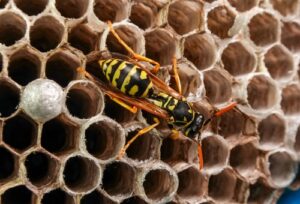Home / Blog / What do Paper Wasps Eat?
What do Paper Wasps Eat?

Scientifically reviewed by Daniel Baldwin, BCE, CCFS, CP-FS
-Published on July 21, 2022
-Updated on March 11, 2025
Paper wasps can be beneficial for landscapes and gardens as their natural prey includes caterpillars and invasive pests, like the emerald ash borer, which can destroy ash trees. Despite the good that paper wasps can bring to the ecosystem, most people don’t appreciate their presence near the home. The sting from these insects is not only painful, but it can also be dangerous if you happen to be allergic to the venom.
To adequately protect and address any paper wasp infestations near your house, learn more about what they look like, where they live, and how to get rid of them.
What are paper wasps?
Paper wasps get their name from the paper-like material (made out of plant material and saliva) they use to build their nests. They are part of the Hymenoptera family (the same as ants and bees). They are semi-social insects, meaning they generally live in group hives made up of workers, males, and queens. Paper wasps don’t feed on humans. They prefer to catch caterpillars, webworms, and oak worms to feed them to their larvae. The adult paper wasps eat the sugars they obtain from nectar, aphids, or the sweet liquids their own larvae produce. Although they’re good at natural pest control due to their diets, most people don’t welcome paper wasps into their home or in the backyard since they do sting humans, sometimes quite aggressively.What do paper wasps look like?
Larger than honey bees but a bit smaller than hornets, paper wasps have slender bodies and measure up ¾ to 1 inch long. A paper wasp’s wings are black, and some species’ bodies are brown with yellow markings while others have a brown tone that is more reddish in color. The coloring is apparent on the wasps’ head, thorax, and abdomen. It can be easy to confuse yellow paper wasps with yellowjackets, but yellowjackets have bodies that are a bit thicker.Where do paper wasps live?
As mentioned above, paper wasps build small nests out of wood fibers from plants. After the workers collect the fibers, they chew the material and use it to create hexagonal cells. The completed nest looks like an upside-down umbrella. A mature paper wasp nest may have up to 30 adults. They typically build their nests and lay their eggs throughout the summer. By fall, queens look for shelters to hibernate and protect their fertilized eggs until the next season. The rest of the paper wasp colony dies off. If you see a wasp nest in the spring, it’s likely a dormant one from last season. Paper wasps do not reuse their old nests from year to year. You’ll often find their tan-colored nests in sheltered spots like:- Beneath the eaves of your house
- Alongside windows, shutters, and door frames
- Hanging from a tree branch
- Under your wooden deck
- Inside a gas grill
- On children’s playground sets
Are paper wasps dangerous?
These wasps can be aggressive, especially if they feel they’re under attack. A paper wasp can sting over and over again if you swat at it or if it feels threatened in a small space, like your home. The sting of a paper wasp is quite painful, and can be fatal if you’re allergic to its venom. Pets can also be stung and experience pain from a sting. Apply ice or cold compresses to a sting to ease the pain. If you get stung by a paper wasp, the area may swell and become extremely irritated. If you’re sensitive to paper wasps stings, the pain and swelling can last for several days. For those who aren’t particularly sensitive, the effects can still be felt for 1-3 days. Take caution when thinking about dealing with an active paper wasps’ nest—if a nest is disturbed by a non-professional, it can result in hundreds of angry insects producing many painful stings to protect their home.How to address a paper wasp infestation
If you have paper wasps around your property or inside your home, it’s best to contact a professional pest service to assess the infestation and determine the safest course of action to address these insects. Pest management services help control outdoor and indoor infestations. The services, like those at Hawx, may include pinpointing the location of a paper wasp colony by locating their nest as well as removal of it. Special attention to a home’s eaves, doorways, and foundations is key because those are locations where these insects tend to build their nests. Treating cracks and crevices around the home to prevent paper wasps from getting inside is another service option.Related Articles
Visit our blog to learn more.
→



